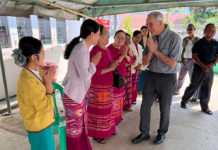More involvement
Editor: The medical staff of Palm Drive Hospital met to discuss
recent events centered around our district board. We will be
represented at the next Board meeting, and we have the following
urgent concerns.
We feel the process involved in handling the conflict of
interest issues with Dr. Gude and OffSiteCare was not appropriate
and that the action threatened the viability of our community
hospital.
Secondly, we think the Board should include at least one
physician in the appointment process for the two unfilled Board
positions.
Thirdly, with the uncoming decisions on a hospital partner, such
as Adventist Health or Marin General, that the hospital medical
staff have significant input prior to any actual motion on such an
alignment.
We look forward to our input at the next Board meeting and hope
to see general public input and attendence on Oct. 3.
Allan Hill, M.D.
General and Vascular Surgery
More harm than good
Editor: Frank Robertson’s trivializing and error-riddled column
(“Brenda and the surfers,” Sept. 22) about the Russian River
Watershed Protection Committee’s lawsuit challenging the Sonoma
County Water Agency’s management plan for the Russian River estuary
is an insult to people who are trying to understand SCWA’s
complicated proposal and RRWPC’s response. I urge everyone who
cares about the river and its wildlife to visit www.rrwpc.org where
they can read the reasoning behind RRWPC’s opinion that “While it
is incredibly important to do everything we can to save the fish,
those of us who have studied the proposal believe this project will
cause more harm than good.”
Carol Sklenicka
Jenner
Not so ‘wacky’
Editor: I was surprised by your editorial regarding the Russian
River Watershed Protection Committees lawsuit against the Sonoma
County Water Agency. It is hardly a case of environmentalist
wanting to “screw the fish.” It is a serious concern about what
closing the mouth and lowering the flows of the Russian River will
do for water quality. Water quality effects us all, humans and
wildlife.
The NMFS plan is flawed in many environmentalists opinions. The
historic low flows of the Russian River were accompanied by vast
riparian woodlands and deep gravel beds. To me it seems NMFS has
picked one small piece of the picture they plan to alter in an
effort to protect fish. I’m guessing it is the easiest most
politically expedient approach. Otherwise they would have to take
on agricultural practices, water diversions along the river and
it’s tributaries, gravel mining and loss of riparian habitat.
This plan is an experiment and I am not a scientist, but it is
hard to imagine how it will work. It seems we are more likely to
end up with warmer water temperatures and more concentrated levels
of toxins in this proposed lagoon. My preference would be to
experiment with allowing the mouth to return to a more natural
state that doesn’t require heavy equipment and constant
manipulation. We need more fish-friendly farming practices and
continue efforts to divert less water from the river and it’s
tributaries.
The “wacky line up” you mention are concerned citizens who
question this costly experiment and the results that may occur.
Sometimes government agencies are misguided and need its citizens
to tell them so.
Sherrie Althouse
Rio Nido
62.2
F
Healdsburg
April 19, 2025







